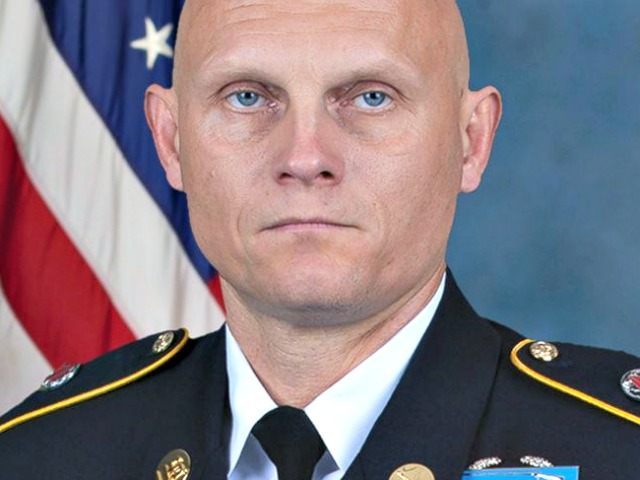WASHINGTON, D.C. — The “courageous” American soldier who was fatally wounded in a rescue mission in Iraq sacrificed his life to save 70 hostages whose “graves had already been dug” and were about to be “brutally” executed by the “barbaric” Islamic State (ISIS/ISIL/IS), U.S. Defense Secretary Ash Carter told reporters at the Pentagon.
He was 19 years-old when he enlisted and went on to serve 14 combat deployments, the majority of them in Iraq and Afghanistan. During his 20 year career in the Army, he received 11 Bronze Stars, including four for combat valor, and numerous other commendations. He was posthumously awarded the Purple Heart.
Carter commended the selfless act of heroism displayed by Delta Force Master Sgt. Joshua L. Wheeler, 39, of Roland, Oklahoma, who died Thursday of injuries sustained while assisting Iraqi Kurdish Peshmerga fighters in saving dozens of lives and ultimately collecting a significant cache of intelligence, even though the initial plan called for the Kurds to do all the fighting.
The incident marked the first U.S. combat death in Iraq since 2011 and the first time American troops had engaged in direct ground combat there since the war against ISIS was launched in August 2014.
“This is someone who saw the team that he was advising and assisting coming under attack, and he rushed to help them and made it possible for them to be effective, and in doing that lost his own life,” Carter said during the Pentagon press briefing Friday.
He added:
The sacrifice and decisive action of this courageous American in support of his comrades reminds us of the dangers that the coalition forces confront in Iraq, but also of the important assistance they provide local forces as they lead the fight against a barbaric enemy.
Carter provided the most detailed public description yet of the pre-dawn raid on an ISIS prison compound near the town of Hawija.
Among the 70 people who were rescued were at least 20 members of the U.S.-trained Iraqi security, reports the Associated Press (AP).
“I made the decision to assist our Kurdish partners after receiving specific actionable intelligence that a mass execution was imminent,” said the Pentagon chief. “As U.S. Special Operations Forces provided airlift support and accompanied Iraqi-Peshmerga, dozens of lives were saved and a significant cache of intelligence was collected.”
The valuable intelligence collected at the scene by U.S. troops and their Kurdish counterparts included documents and electronics, revealed Carter.
“We have now heard from rescued hostages. They expected to be executed that day, after morning prayers. Their grave had already been prepared,” he continued. “Not only did our support help [prevent] another mass killing, we enabled those partners of ours to deliver ISIL a clear defeat, and prevented them from broadcasting a horrific massacre to the world.”
Carter declared that he expects American forces to be involved in similar raids against ISIS targets, noting that it is a component of what the Pentagon refers to as a “train, advise, and assist” mission in support of Iraqi forces.
“It doesn’t represent us assuming a combat role. It represents a continuation of our advise and assist mission,” argued the U.S. defense secretary at one point.
However, in noting that it is difficult to fully know what transpired during the Hawija raid, he later added, “This is combat; things are complicated.”
Carter described Wheeler as a hero, saying, “Our thoughts and prayers go out” to his family and loved ones, and he noted that he and his wife will be present when the sergeant’s body is returned to the U.S. on Saturday.
“As the compound was being stormed, the plan was not for the U.S. advise and assist and accompanying forces to enter the compound or be involved in the fire fight,” he told reporters. He continued:
However, when a fire fight ensued, this American did what I’m very proud that Americans do in that situation. He ran to the sound of the guns, and he stood up, and all the indications are it was his actions and that of one of his teammates that protected those who were involved in breaching the compound and made the mission successful.
“So that was an inherent risk that we ask people to assume. Again, it wasn’t part of the plan, but it was something that he did,” Carter added. “And I’m immensely proud that he did that. I’m obviously very saddened that he lost his life. But you know, nobody should be in any illusions … that Americans are [not] at risk.”
The Kurds were reportedly transported by the American troops abroad five U.S. helicopters.
After suffering his wounds, Wheeler was transported from the scene to Irbil, Iraq, where he died after receiving medical treatment.
The sergeant was assigned to the U.S. Army Special Operations Command in Fort Bragg, North Carolina.
“U.S. combat troops have rarely, if ever, participated directly in combat against IS fighters on the ground since the U.S. mission began in 2014,” notes the AP. “The U.S. has mostly limited its role to training and advising Iraqi and Kurdish forces, airdropping humanitarian relief supplies and providing daily airstrikes in IS-held areas of Iraq and Syria.”
